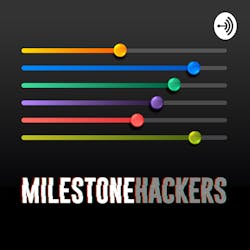For a podcast listener, Smash Notes is a way to quickly experience any podcast and to find things that really resonate with you. Instead of listening to a full 30 minutes of this episode, for example, you can look over the segments and listen to bits you like first, then if you like it, dive in to the entire episode on your phone or wherever else you're listening to the podcast normal. For podcasters, Smash Notes is a tool to segment the podcast in a way that's sharable among different audiences.
Kirill Zubovsky has a podcast called Rad Dad where he interviews dads, often entrepreneurs, They talk about many different subjects: kids, education, work and all kinds of things. He needed Smashed Notes to share his own podcast with different audiences.
Specifically, it started with Chris Ballew, who goes by a stage name Caspar Babypants. Kirill and Chris talked about his punk rock career, MTV, parenting, divorce, business and more, and at the time there was way to share this this multidimensional episode with Kirill's friends, without asking everyone to listen to the whole hour+ recording. Smash Notes was born.
Kirill says that being a developer it's a lot faster for him to create a product and put it in front of the user than to start with a splash page. He created a quick initial version, made some notes and emailed to a group of friends to see their response.
Kirill says it definitely helps to know how to code. Instead of designing something first, and then building it out, he can just go through the whole process in code, and be able to iterate with a live product very quickly.
At one point after college, Kirill moved to Seattle to get time on his own, without any distractions, to learn how to code. He learned through books, blogs, and just writing a lot of code. At one point, he rented a desk from TeachStreet, a local startup. Whenever he'd run into technical issue, he would ask their lead engineer and get help, which was incredibly useful to resolve issues quickly.
Google a lot. Professional developers spend half of their day on Google and Stack Overflow, looking for the same answers they've looked for before. All the answers are already freely available online, but you have to learn enough about code to know what to look for, and how to find it.
Simply login and find your favorite podcast in search, and start making notes. Eventually, there will be premium paid features for the podcasters to subscribe to, but right now the service is free to use for anyone who would like to help and extend the human knowledge with all the interesting bits hidden inside podcast audio.
Andreessen Horowitz released a report saying there are 700,000 podcasts available and counting. That's roughly 80-years worth of audio. There is lot of work to be done to ensure that all that knowledge is unlocked and available to the world.
All the notes are backed up by the original podcast audio. Whenever a Smash Notes looks interesting, you can click to play the audio where the note came from. This way not only can you get relevant and concise information fast, all of the knowledge is backed up by a credible source.
Every Smash Notes segment is a searchable bit, which means an hour long podcast can now be split into dozens individuals searchable queries. For example, you can now find answers to questions like: Why is it important to pay attention to mental health, or How much does a billion dollars change your life?
Previously all this information was hidden deep inside a long audio, and only searchable through transcripts, available to those willing to invest the time. With Smash Notes, you
can now find thousands of questions like this, available in short bits, consumable in seconds.
Take a look at the post The story of how My Dad Wrote A Porno podcast turned Smash Notes upside-down for an example of how one simple SEO query could yield tens of thousands of visitors, and millions of impressions.
With Smash Notes, you can repurpose old podcast episodes into new sharable content. Make a few snippets and share them individually, or create highlights for the entire episodes and turn it into an insightful blog post.
Once you turn monolithic audio into moldable text, opportunities to share this text are unbound!
